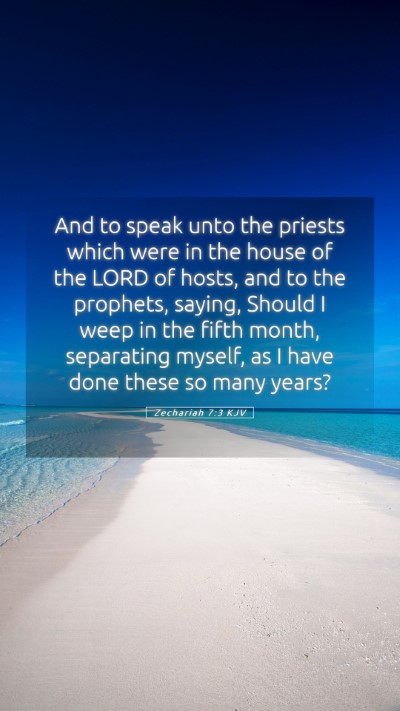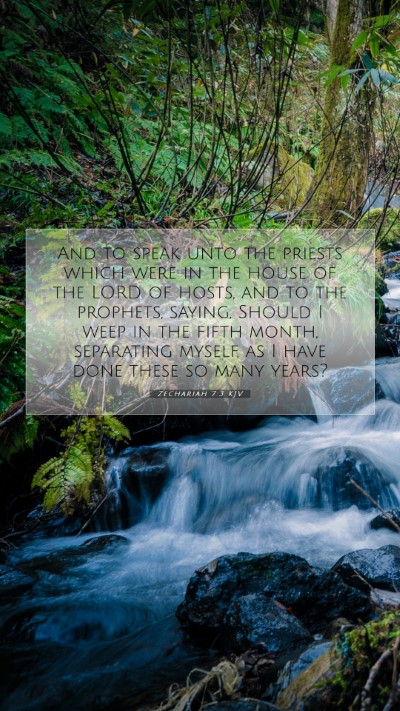Old Testament
Genesis Exodus Leviticus Numbers Deuteronomy Joshua Judges Ruth 1 Samuel 2 Samuel 1 Kings 2 Kings 1 Chronicles 2 Chronicles Ezra Nehemiah Esther Job Psalms Proverbs Ecclesiastes Song of Solomon Isaiah Jeremiah Lamentations Ezekiel Daniel Hosea Joel Amos Obadiah Jonah Micah Nahum Habakkuk Zephaniah Haggai Zechariah MalachiZechariah 7:3 Meaning
What is the meaning of Zechariah 7:3?
And to speak unto the priests which were in the house of the LORD of hosts, and to the prophets, saying, Should I weep in the fifth month, separating myself, as I have done these so many years?
Zechariah 7:3 Bible Verse Meaning
Bible Verse Meaning: Zechariah 7:3
In Zechariah 7:3, the verse states, "And to speak unto the priests which were in the house of the Lord of hosts, and to the prophets, saying, Should I weep in the fifth month, separating myself, as I have done these so many years?" This verse reflects a significant moment of inquiry regarding the practices of mourning that were observed by the Israelites in the context of their exile and restoration.
Contextual Background
This verse arises during a time in which the exiled Israelites have returned to Jerusalem, and the question posed reflects their deeper spiritual struggles and desire for guidance from God. This also ties into their observances related to mourning, particularly for the destruction of the temple.
Insights from Commentaries
-
Matthew Henry's Commentary
Matthew Henry emphasizes the importance of understanding the significance behind the mourning practices. He notes that the question raised indicates a feeling of uncertainty among the people regarding the necessity of maintaining traditional practices that may no longer hold the same relevance post-exile. Henry suggests that God is more concerned with the sincerity of the people's hearts rather than mere ritualistic practices.
-
Albert Barnes' Notes
Albert Barnes elaborates that this inquiry reflects the confusion and spiritual disconnection felt by the Israelites. Barnes stresses that while mourning had its place due to historical circumstances, there was an expectation for the people to realign their practices in accordance with their renewed covenant relationship with God. This verse challenges them to evaluate whether their tears represented genuine repentance or were merely a tradition maintained out of habit.
-
Adam Clarke's Commentary
Adam Clarke includes observations on the cultural customs surrounding mourning similar to that of ancient Israel. Clarke states that the fifth month was particularly associated with grief, marking the destruction of both the first and second temples. He highlights the shift in the spiritual atmosphere post-exile, where the emphasis should transition from mourning for past losses to rejoicing in newfound opportunities to worship and rebuild. Clarke encourages believers to examine their practices, ensuring they align with a living faith rather than mere historical observance.
Biblical Exegesis and Spiritual Application
In the pursuit of Bible verse interpretations, Zechariah 7:3 calls for a deeper understanding of how historical context informs current spiritual practices. For modern believers, the lesson extends to the importance of aligning our religious observances with a heart that seeks God rather than adhering to traditions that may no longer bear significance. This will encourage meaningful engagement in Bible study groups and online Bible study platforms as we explore the richness of Scriptural insights.
Related Bible Verses
- Jeremiah 31:12 - Offers hope and reassurance of restoration.
- Isaiah 58:5-7 - Discusses the true nature of fasting and worship.
- Haggai 1:7 - Calls for the people to reflect and consider their ways.
- Matthew 23:23 - Highlights the importance of justice, mercy, and faith over rituals.
- Philippians 3:3 - Encourages worship in spirit rather than reliance on traditions.
Conclusion
The essence of Zechariah 7:3 transcends mere inquiry about mourning; it beckons believers to a transformative understanding of how we engage with our faith. It is a call to seek heart-centered worship that leads to true repentance and joy in the Lord's presence. In our Bible study lessons and courses, we can delve deeper into how to interpret Bible verses effectively, enhancing both personal and communal spiritual journeys, thus applying Bible verses to daily life with authenticity and purpose.


